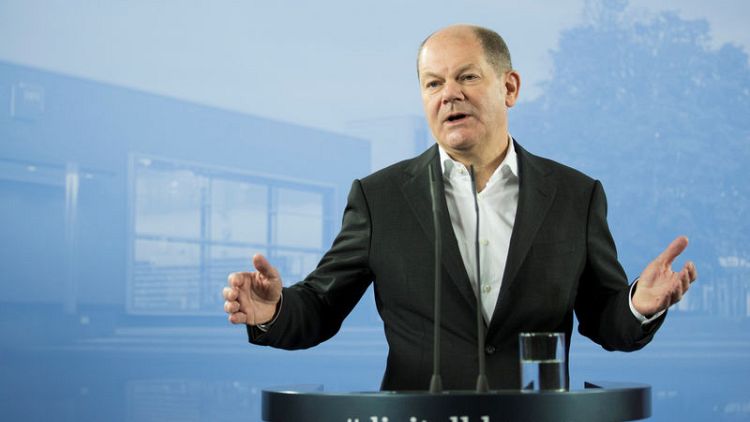By Francesco Guarascio
BRUSSELS (Reuters) - European Union leaders will ditch proposals to use a euro zone budget for economic stabilisation and restrict any funds to long-standing EU goals of convergence among their economies and increasing competitiveness, draft summit conclusions showed on Wednesday.
The likely outcome of Friday's summit are a blow to German Finance Minister Olaf Scholz, a Social Democrat who wanted any euro zone budget to play a stabilisation role via a shared unemployment insurance scheme for the zone's 19 member states.
It is also a setback for the European Commission, which wanted the budget to stabilise investment spending in euro zone countries during crises, as capital expenditure usually is first to suffer when a government looks for savings in a downturn.
The euro zone bailout fund has argued for a common fund that could lend to governments that get into trouble.
But EU officials said the Netherlands, backed by several northern European countries and German conservatives, strongly opposed such plans during debate on the summit agenda. Many dispute there is a need for any separate euro zone budget.
So now the summit will only ask euro zone finance ministers "to work on the design, modalities of implementation and timing of the budgetary instrument for convergence and competitiveness," according to a draft seen by Reuters on Wednesday.
The draft conclusions are to be adopted on Friday by all EU leaders except Britain, which will leave the EU next March, as part of a discussion on deepening the economic integration of the single currency area to make it more resilient to crises.
The draft said the euro zone budget would not be a separate pool of money, as proposed by French President Emmanuel Macron, but part of the overall EU budget and "subject to criteria and strategic guidance" from the euro zone countries.
DEPOSIT SCHEME NOT MENTIONED
Its size would be determined by all 27 EU leaders "in the context" of the bigger EU budget and the leaders asked for the broad features of such a budget to be prepared by June 2019.
That is likely to limit its size, since the overall EU budget is one percent of the EU's gross national income.
Macron and others have called for the euro zone budget to be up to several percent of euro zone GDP.
The draft does not go into any detail on what the two main purposes of the future budget -- convergence and competitiveness -- mean, leaving it to finance ministers to work it out. France and Germany said in June that the two objectives would be "delivered through investment in innovation and human capital."
The conclusions are also careful to avoid any reference to another highly controversial topic in the euro zone integration plan -- the European Deposit Insurance Scheme (EDIS).
It is the last missing element from a banking union. But officials said Germany, the Netherlands and other northern countries feared that an agreement on EDIS now could mean they would be burdened with the repayment of deposits in countries like Italy, Greece or Portugal, where banks are vulnerable.
After a year of talks, EU finance ministers were unable to agree even on when to start discussing EDIS and the draft showed leaders were careful to avoid any direct reference to the scheme, focusing instead on reducing existing risks in banks.
"We look forward to the final adoption of the Banking Package and the non-performing loans (NPL) Prudential Backstop ... which are important for further progress towards risk reduction and risk sharing. We call to advance work on the Banking Union," the draft said.
($1 = 0.8813 euros)
(Writing by Jan Strupczewski; Editing Alastair Macdonald)



